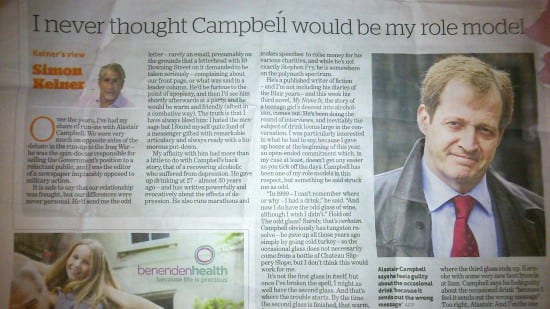When I was in London last month, I came across a column in one of those wide-spread newspapers that seems to appear everywhere – the metro-kind of papers. I sat down in a café, escaping the English rain, and found a column by Simon Kelner right in front of me. I wasn’t particularly interested at first, but had a look anyway. You know how certain words spark your attention and your eyes seem programmed to find them, wherever they appear? To me, words like alcohol, drink, drug or environment work exactly that way.
This particular Friday, that’s what happened; out of that article DRINK pulled my interest and I curiously read through the column. The author discussed his relationship with Alastair Campbell – originally a journalist who worked for the UK Labour government in early 2000s, and a former alcoholic. In September, Campbell released a book called My Name Is, about a teenage girl and her struggle with alcohol. Relevant to the author, he explains, because he himself just gave up alcohol a few months back.
Now, my blog entry is not about their commitments or their relationship to alcohol. It got me thinking. When was the last time I saw a prominent editor in a large newspaper discuss alcohol in a “I-just-gave-up-drinking” kind of manner? I couldn’t recall a single one. Living free from alcohol is quite a usual thing, amounting to some 24% of the population in the London area, according to a 2011 report. But still the topic is rarely discussed or seldom an issue in the papers or on TV. Why is that so? Why are we not talking to each other about alcohol? It is such an important part of people’s lives and amounts to a lot of troubles; it seems to me like such a natural thing to discuss. Yet it isn’t.
The column did indeed make me happy, and it was quite interesting to see that people actually take pledges not to use alcohol – even though they’re 55-year-old newspaper columnists.


Yes, I also know the phenomenon that certain words seem to magically catch my eye, but it’s not only words. Also combinations of colours or logos or certain, particular sounds catch my attention. To my mind, this is prove of how big the influence of culture around is on our thinking and perceiving, how much we’re being framed and choose to condition ourselves.
Thank you for sharing the evidence of how many adults in London choose to live free from alcohol. It’s cool to know – and as you allude to reveals a lot about today’s alcohol culture that we don’t talk about them, that the “market” doesn’t supply them with good drinks and interesting nightlife opportunities.
And to your most prominent question, which are really two: one concerning why the media don’t take up alcohol and the other one why people don’t talk about alcohol. I wrote a blogg entry about democracy where I also address the reason why the media increasingly only show a glamorized picture of alcohol, but leave the dimension that you call “I-just-gave-up-drinking”. http://movendi.ngo/policyofficerupdate/371/alcohol-harms-democracy/ Let me know what you think about it, please.
To the second question I’d try and say that there are different levels of competence among people of different societies in talking about alcohol. I experience that there’s a different understanding for the policy side of the alcohol discussion in Scandinavia and even in countries like Thailand and Kenya. But in Germany talk is mainly about individual behaviour. So one reason for me is that some societies have come further as a collective in grasping alcohol which allows to have certain conversations and stifles them in countries that are lacking behind.